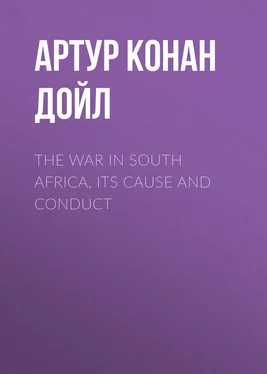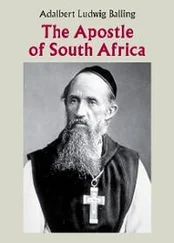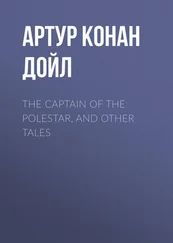Артур Дойл - The War in South Africa, Its Cause and Conduct
Здесь есть возможность читать онлайн «Артур Дойл - The War in South Africa, Its Cause and Conduct» — ознакомительный отрывок электронной книги совершенно бесплатно, а после прочтения отрывка купить полную версию. В некоторых случаях можно слушать аудио, скачать через торрент в формате fb2 и присутствует краткое содержание. Жанр: foreign_antique, foreign_prose, на английском языке. Описание произведения, (предисловие) а так же отзывы посетителей доступны на портале библиотеки ЛибКат.
- Название:The War in South Africa, Its Cause and Conduct
- Автор:
- Жанр:
- Год:неизвестен
- ISBN:нет данных
- Рейтинг книги:5 / 5. Голосов: 1
-
Избранное:Добавить в избранное
- Отзывы:
-
Ваша оценка:
- 100
- 1
- 2
- 3
- 4
- 5
The War in South Africa, Its Cause and Conduct: краткое содержание, описание и аннотация
Предлагаем к чтению аннотацию, описание, краткое содержание или предисловие (зависит от того, что написал сам автор книги «The War in South Africa, Its Cause and Conduct»). Если вы не нашли необходимую информацию о книге — напишите в комментариях, мы постараемся отыскать её.
The War in South Africa, Its Cause and Conduct — читать онлайн ознакомительный отрывок
Ниже представлен текст книги, разбитый по страницам. Система сохранения места последней прочитанной страницы, позволяет с удобством читать онлайн бесплатно книгу «The War in South Africa, Its Cause and Conduct», без необходимости каждый раз заново искать на чём Вы остановились. Поставьте закладку, и сможете в любой момент перейти на страницу, на которой закончили чтение.
Интервал:
Закладка:
Arthur Conan Doyle
The War in South Africa, Its Cause and Conduct
PREFACE
For some reason, which may be either arrogance or apathy, the British are very slow to state their case to the world. At present the reasons for our actions and the methods which we have used are set forth in many Blue-books, tracts, and leaflets, but have never, so far as I know, been collected into one small volume. In view of the persistent slanders to which our politicians and our soldiers have been equally exposed, it becomes a duty which we owe to our national honour to lay the facts before the world. I wish someone more competent, and with some official authority, had undertaken the task, which I have tried to do as best I might from an independent standpoint.
There was never a war in history in which the right was absolutely on one side, or in which no incidents of the campaign were open to criticism. I do not pretend that it was so here. But I do not think that any unprejudiced man can read the facts without acknowledging that the British Government has done its best to avoid war, and the British Army to wage it with humanity.
To my publisher and to myself this work has been its own reward. In this way we hope to put the price within the reach of all, and yet leave a profit for the vendor. Our further ambition is, however, to translate it into all European tongues, and to send a free copy to every deputy and every newspaper on the Continent and in America. For this work money will be needed – a considerable sum. We propose to make an appeal to the public for these funds. Any sums which are sent to me or to my publisher will be devoted to this work. There cannot be too much, for the more we get the more we shall do.
I may add that I have not burdened my pages with continual references. My quotations are reliable and can always, if necessary, be substantiated.
A. CONAN DOYLE.Undershaw, Hindhead:
January, 1902.
CHAPTER I
THE BOER PEOPLE
It is impossible to appreciate the South African problem and the causes which have led up to the present war between the British Empire and the Boer republics without some knowledge, however superficial, of the past history of South Africa. To tell the tale one must go back to the beginning, for there has been complete continuity of history in South Africa, and every stage has depended upon that which has preceded it. No one can know or appreciate the Boer who does not know his past, for he is what his past has made him.
It was about the time when Oliver Cromwell was at his zenith – in 1652, to be pedantically accurate – that the Dutch made their first lodgment at the Cape of Good Hope. The Portuguese had been there before them, but, repelled by the evil weather, and lured forward by rumours of gold, they had passed the true seat of empire, and had voyaged farther, to settle along the eastern coast. But the Dutchmen at the Cape prospered and grew stronger in that robust climate. They did not penetrate far inland, for they were few in number, and all they wanted was to be found close at hand. But they built themselves houses, and they supplied the Dutch East India Company with food and water, gradually budding off little townlets, Wynberg, Stellenbosch, and pushing their settlements up the long slopes which lead to that great central plateau which extends for 1,500 miles from the edge of the Karoo to the Valley of the Zambesi.
For a hundred more years the history of the colony was a record of the gradual spreading of the Africanders over the huge expanse of veldt which lay to the north of them. Cattle-raising became an industry, but in a country where six acres can hardly support a sheep, large farms are necessary for even small herds. Six thousand acres was the usual size, and 5 l. a year the rent payable to Government. The diseases which follow the white man had in Africa, as in America and Australia, been fatal to the natives, and an epidemic of smallpox cleared the country for the new-comers. Farther and farther north they pushed, founding little towns here and there, such as Graaf-Reinet and Swellendam, where a Dutch Reformed Church and a store for the sale of the bare necessaries of life formed a nucleus for a few scattered dwellings. Already the settlers were showing that independence of control and that detachment from Europe which has been their most prominent characteristic. Even the mild sway of the Dutch Company had caused them to revolt. The local rising, however, was hardly noticed in the universal cataclysm which followed the French Revolution. After twenty years, during which the world was shaken by the Titanic struggle in the final counting up of the game and paying of the stakes, the Cape Colony was added in 1814 to the British Empire.
In all the vast collection of British States there is probably not one the title-deeds to which are more incontestable than to this. Britain had it by two rights, the right of conquest and the right of purchase. In 1806 troops landed, defeated the local forces, and took possession of Cape Town. In 1814 Britain paid the large sum of six million pounds to the Stadtholder for the transference of this and some South American land. It was a bargain which was probably made rapidly and carelessly in that general redistribution which was going on. As a house of call upon the way to India the place was seen to be of value, but the country itself was looked upon as unprofitable and desert. What would Castlereagh or Liverpool have thought could they have seen the items which they were buying for six million pounds? The inventory would have been a mixed one of good and of evil: nine fierce Kaffir wars, the greatest diamond mines in the world, the wealthiest gold mines, two costly and humiliating campaigns with men whom we respected even when we fought with them, and now at last, we hope, a South Africa of peace and prosperity, with equal rights and equal duties for all men.
The title-deeds to the estate are, as I have said, good ones, but there is one singular and ominous flaw in their provisions. The ocean has marked three boundaries to it, but the fourth is undefined. There is no word of the 'hinterland,' for neither the term nor the idea had then been thought of. Had Great Britain bought those vast regions which extended beyond the settlements? Or were the discontented Dutch at liberty to pass onwards and found fresh nations to bar the path of the Anglo-Celtic colonists? In that question lay the germ of all the trouble to come. An American would realise the point at issue if he could conceive that after the founding of the United States the Dutch inhabitants of the State of New York had trekked to the westward and established fresh communities under a new flag. Then, when the American population overtook these western States, they would be face to face with the problem which this country has had to solve. If they found these new States fiercely anti-American and extremely unprogressive, they would experience that aggravation of their difficulties with which British statesmen have had to deal.
At the time of their transference to the British flag the colonists – Dutch, French, and German – numbered some thirty thousand. They were slaveholders, and the slaves were about as numerous as themselves. The prospect of complete amalgamation between the British and the original settlers would have seemed to be a good one, since they were of much the same stock, and their creeds could only be distinguished by their varying degrees of bigotry and intolerance. Five thousand British emigrants were landed in 1820, settling on the Eastern borders of the colony, and from that time onwards there was a slow but steady influx of English-speaking colonists. The Government had the historical faults and the historical virtues of British rule. It was mild, clean, honest, tactless, and inconsistent. On the whole, it might have done very well had it been content to leave things as it found them. But to change the habits of the most conservative of Teutonic races was a dangerous venture, and one which has led to a long series of complications, making up the troubled history of South Africa.
Читать дальшеИнтервал:
Закладка:
Похожие книги на «The War in South Africa, Its Cause and Conduct»
Представляем Вашему вниманию похожие книги на «The War in South Africa, Its Cause and Conduct» списком для выбора. Мы отобрали схожую по названию и смыслу литературу в надежде предоставить читателям больше вариантов отыскать новые, интересные, ещё непрочитанные произведения.
Обсуждение, отзывы о книге «The War in South Africa, Its Cause and Conduct» и просто собственные мнения читателей. Оставьте ваши комментарии, напишите, что Вы думаете о произведении, его смысле или главных героях. Укажите что конкретно понравилось, а что нет, и почему Вы так считаете.












